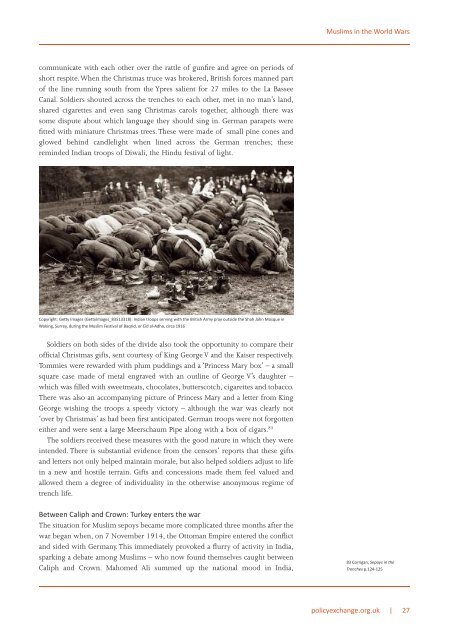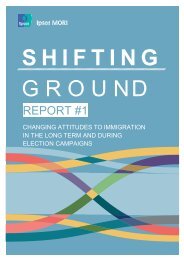You also want an ePaper? Increase the reach of your titles
YUMPU automatically turns print PDFs into web optimized ePapers that Google loves.
communicate with each other over the rattle of gunfire and agree on periods of<br />
short respite. When the Christmas truce was brokered, British forces manned part<br />
of the line running south from the Ypres salient for 27 miles to the La Bassee<br />
Canal. Soldiers shouted across the trenches to each other, met in no man’s land,<br />
shared cigarettes and even sang Christmas carols together, although there was<br />
some dispute about which language they should sing in. German parapets were<br />
fitted with miniature Christmas trees. These were made of small pine cones and<br />
glowed behind candlelight when lined across the German trenches; these<br />
reminded Indian troops of Diwali, the Hindu festival of light.<br />
Copyright: Getty Images (GettyImages_83513318): Indian troops serving with the British Army pray outside the Shah Jahn Mosque in<br />
Woking, Surrey, during the Muslim Festival of Baqrid, or Eid al-Adha, circa 1916<br />
Soldiers on both sides of the divide also took the opportunity to compare their<br />
official Christmas gifts, sent courtesy of King George V and the Kaiser respectively.<br />
Tommies were rewarded with plum puddings and a ‘Princess Mary box’ – a small<br />
square case made of metal engraved with an outline of George V’s daughter –<br />
which was filled with sweetmeats, chocolates, butterscotch, cigarettes and tobacco.<br />
There was also an accompanying picture of Princess Mary and a letter from King<br />
George wishing the troops a speedy victory – although the war was clearly not<br />
‘over by Christmas’ as had been first anticipated. German troops were not forgotten<br />
either and were sent a large Meerschaum Pipe along with a box of cigars. 83<br />
The soldiers received these measures with the good nature in which they were<br />
intended. There is substantial evidence from the censors’ reports <strong>that</strong> these gifts<br />
and letters not only helped maintain morale, but also helped soldiers adjust to life<br />
in a new and hostile terrain. Gifts and concessions made them feel valued and<br />
allowed them a degree of individuality in the otherwise anonymous regime of<br />
trench life.<br />
Between Caliph and Crown: Turkey enters the war<br />
The situation for Muslim <strong>sep</strong>oys became more complicated three months after the<br />
war began when, on 7 November 1914, the Ottoman Empire entered the conflict<br />
and sided with Germany. This immediately provoked a flurry of activity in India,<br />
sparking a debate among Muslims – who now found themselves caught between<br />
Caliph and Crown. Mahomed Ali summed up the national mood in India,<br />
Muslims in the World Wars<br />
83 Corrigan, Sepoys in the<br />
Trenches p.124-125<br />
policyexchange.org.uk | 27



